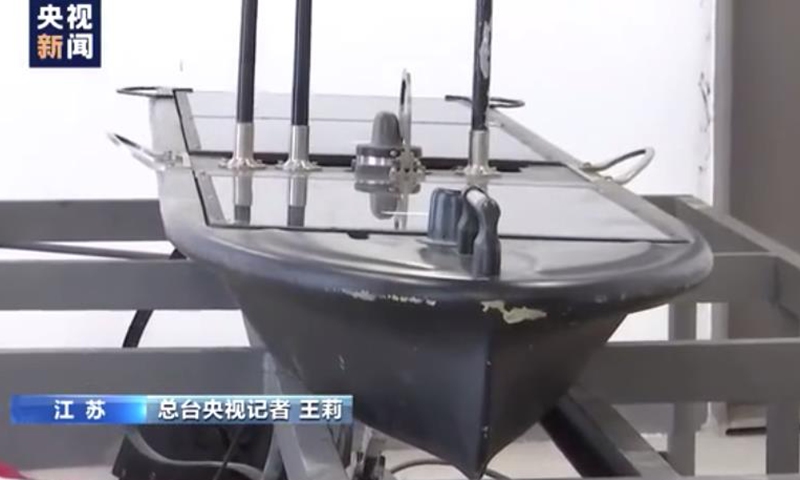
Photo: Screenshot of CCTV News
China has awarded 91 fishermen living in coastal cities for capturing different types of foreign devices with spying functions since 2016 as the country faces a growing threat to its maritime security.
A report published by Central China Television on Wednesday, a day ahead of the National Security Education Day, revealed that fishermen from various cities in East China's Jiangsu and Zhejiang provinces, South China's Hainan province and Guangxi Zhuang Autonomous Region have reported to the government that they had caught foreign spy devices.
In one example, a fisherman in Yancheng, Jiangsu Province, caught a device that looks like a boat with a length of about 3 meters. Tang Jiansheng, an expert on underwater acoustic engineering, told the media that the top looks like a boat but has a part on the bottom which is made up of six wings connected by an umbilical cord. It has a propeller behind it and, judging from its shape, it is actually a wave glider.
This wave glider has very good directional control under water, so it should be one of the most advanced designs. The expert said the wave glider is a new type of marine unmanned device, powered by the waves' ups and downs, marching forward using solar energy for gathering data, communication, and positioning. The glider carries a huge number of sensors, which are also able to measure environmental parameters of the oceans.
This unmanned underwater vehicle is not a piece of equipment manufactured or used by China. It can be confirmed that it is a secret spying device covertly launched by a foreign country in China's waters. It has advanced performance and powerful functions and can fulfill reconnaissance and intelligence gathering missions, the expert said.
The equipment that foreign countries put into China's waters can collect data on ocean currents, hydrology, temperature, humidity, salinity, pollutants, among others. These data and information are sensitive state secrets and these are acts of espionage and theft, said a police officer from the state secret bureau of Taizhou, Zhejiang, according to CCTV.
Once illegally collected or stolen, these data will affect the activities of our warships and submarines, the launch of underwater missiles, the detection and communication of anti-submarine sonar, the exploration of oil and gas fields and construction activities, and pose a serious threat to our homeland security, military security and deep-sea security, the officer said.
Foreign spy and intelligence agencies take the sea as a new battlefield, using technology and human means to carry out intelligence gathering activities in China's coastal areas, the officer added.
According to the CCTV report, state security organs have earnestly strengthened technology development, actively carried out special operations, adopted advanced technological means to continuously prevent technology theft, and actively discovered and detected a number of special secret theft devices that were put into use in key areas such as the South China Sea.
On August 21, 2020, a suspicious device was detected by national security organs in the sea, 30 nautical miles southeast of Sanya, Hainan. It was a particularly special secret theft device, the report said.
The report said that since 2016, a number of overseas devices have been seized in coastal areas such as Jiangsu, Zhejiang and Hainan and 91 fishermen and related personnel have been rewarded.
In January 2020, 11 fishermen received rewards by the local government of Jiangsu Province after capturing several underwater spy devices and giving them to the national security authorities in 2019.
Some of the devices can collect information on hydrologic characteristics of the sea and map the seabed. Others can collect data on a ship's sound print, which can be used for military purposes such as detecting submarine and ship movements and early warning detection, media reported.




